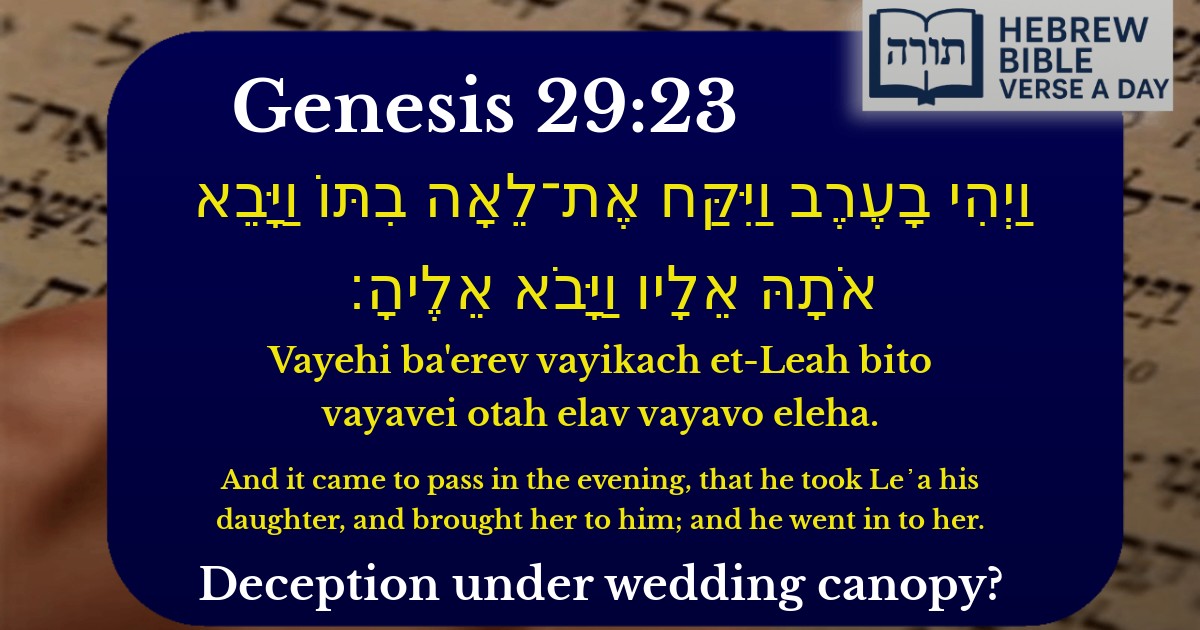Join Our Newsletter To Be Informed When New Videos Are Posted
Join the thousands of fellow Studends who rely on our videos to learn how to read the bible in Hebrew for free!
Hebrew Text
וַיְהִי בָעֶרֶב וַיִּקַּח אֶת־לֵאָה בִתּוֹ וַיָּבֵא אֹתָהּ אֵלָיו וַיָּבֹא אֵלֶיהָ׃
English Translation
And it came to pass in the evening, that he took Le᾽a his daughter, and brought her to him; and he went in to her.
Transliteration
Vayehi ba'erev vayikach et-Leah bito vayavei otah elav vayavo eleha.
Hebrew Leining Text
וַיְהִ֣י בָעֶ֔רֶב וַיִּקַּח֙ אֶת־לֵאָ֣ה בִתּ֔וֹ וַיָּבֵ֥א אֹתָ֖הּ אֵלָ֑יו וַיָּבֹ֖א אֵלֶֽיהָ׃
וַיְהִ֣י בָעֶ֔רֶב וַיִּקַּח֙ אֶת־לֵאָ֣ה בִתּ֔וֹ וַיָּבֵ֥א אֹתָ֖הּ אֵלָ֑יו וַיָּבֹ֖א אֵלֶֽיהָ׃
🎵 Listen to leining
Parasha Commentary
📚 Talmud Citations
This verse is quoted in the Talmud.
📖 Megillah 13b
The verse is referenced in the context of discussing the deception of Laban towards Jacob, where Leah was given to Jacob instead of Rachel.
📖 Bava Batra 123a
The verse is cited in a discussion about the lineage and marriages of the patriarchs, particularly focusing on Jacob's marriage to Leah.


Context in the Torah
The verse (Bereshit 29:23) describes how Lavan deceived Yaakov by giving him Leah instead of Rachel on their wedding night. This event is part of the broader narrative of Yaakov's time in Charan, where he worked for Lavan to marry Rachel.
Rashi's Explanation
Rashi (Bereshit 29:23) explains that Lavan took advantage of the darkness of evening to substitute Leah for Rachel. He notes that Yaakov had given Rachel specific signs to confirm her identity, but Leah, with Rachel's reluctant cooperation, used those signs to deceive Yaakov. Rashi further comments that this deception was measure-for-measure (middah k'neged middah) for Yaakov's earlier deception of his father Yitzchak when he took the blessings meant for Esav.
Midrashic Insights
Halachic and Ethical Considerations
The Rambam (Hilchos Ishus 2:14-15) discusses the halachic implications of this episode, noting that a marriage contracted under deception is still valid, though morally reprehensible. The Talmud (Bava Basra 123a) also analyzes this event in the context of inheritance laws, as Leah's status as Yaakov's wife had lasting consequences for tribal lineage.
Symbolic Interpretations
Some commentators see deeper symbolism in this event: